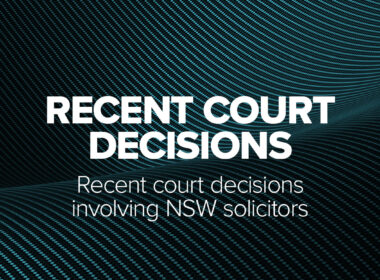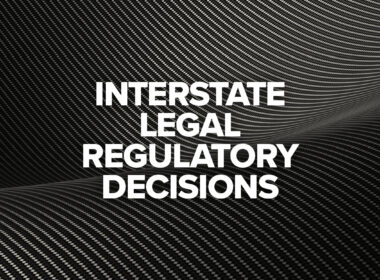Legal disciplinary decisions: NSW Supreme Court and Court of Appeal
Council of the New South Wales Bar Association v de Robillard [2023] NSWCATOD 75
Decision published: 1 June 2023
On 10 December 2021, the New South Wales Civil and Administrative Tribunal (Tribunal) published a decision in which it found that a solicitor, Mr Christian Roger de Robillard, had engaged in the following:
- Unsatisfactory professional conduct by allowing to be commenced, and maintaining, a set of proceedings in the Supreme Court of New South Wales (Supreme Court), in circumstances where those proceedings:
- invoked the coercive powers of the Supreme Court without reasonable justification on the materials available to Mr de Robillard, contrary to rule 60(a) of the Legal Profession Uniform Conduct (Barristers) Rules 2015 (Barristers Rules);
- made allegations or suggestions under privilege without reasonable justification on the materials available to Mr de Robillard, contrary to rule 61(a) of the Barristers Rules;
- alleged matters of fact in documents where available factual material did not provide a proper basis to do so, contrary to rule 64(a) of the Barristers Rules; and
- alleged matters amounting to serious misconduct, when Mr de Robillard did not believe on reasonable grounds that there was available material by which those allegations could be supported, contrary to rule 65(a) of the Barristers Rules.
- Professional misconduct by failing to comply with a set of Supreme Court orders, which required Mr de Robillard to pay costs in relation to interlocutory proceedings.
On 1 June 2023, the Tribunal published a separate decision and made orders, among other things, recommending that Mr de Robillard’s name be removed from the Roll kept by the Supreme Court and the Australian Legal Profession Register.
The Tribunal held:
“[386] … In order for the Respondent to be fit to continue practice in the face of the finding made against him in the Stage 1 hearing, it would, in our view, be necessary for him to acknowledge his fault in the conduct found by us to be professional misconduct and unsatisfactory professional conduct. Further, he would need to acknowledge his conduct in the previous findings which were made against him by the Bar Council of unsatisfactory professional conduct, rather than attributing those findings to the influence of others conducting a vendetta against him. He would have needed to demonstrate insight which would satisfy us he understood what that improper conduct was, how he came to conduct himself in relation to same, and what he has done or will do to ensure no such circumstance will occur again. Largely, that has not occurred.
Although the Respondent did in his final submission acknowledge some wrongdoing on his part, he was still not, in our view, accepting full responsibility for same. He still demonstrates he is convinced he is the subject of a personal victimisation by Mr Selth, a former CEO of the NSW Bar Association and some other members of the Bar Council over a number of years. He attributes this victimisation as being consequent to his involvement with the government of Vanuatu and his having to be rescued from that place following his incarceration during a political upheaval or event in that country.
His action in writing to the Governor of NSW about the appointment of Justice Harrison to the Supreme Court of NSW suggests to us that he does not have the benefit of a mind which urges caution when he is planning to take action which will or can have adverse consequences for another person, and where he is likely to be the subject of criticism from his peers and his colleagues in the legal profession, or action from the Bar Association.
The ability to practise as a lawyer carries with it a great responsibility to the Court, the public and to the reputation of the profession as a whole. It also carries with it specific obligations to fully recognise the role of the regulatory body in respect of overseeing the professional standards required of practitioners. Those requirements, set by the regulatory body, ensure that standards are met and the public are thereby protected. Fitness to practice as a lawyer requires the recognition of that responsibility and an understanding of the limits which should not be crossed. Unfortunately for the Respondent he has not demonstrated to us that he understands, or accepts, those limits and will abide by them if he is permitted to continue as a barrister or practicing lawyer.
He has not given evidence as to how he would ensure there will be no further misconduct by him if he could continue to practise as a barrister or Australian-registered lawyer.
We conclude that at the time of this determination the Respondent is not “fit to practise” as a legal practitioner and we find he is probably permanently unfit to practise.”
Amirbeaggi v NSW Legal Services Commissioner [2023] NSWSC 555
Decision published: 26 May 2023
On 26 May 2023, the Supreme Court of New South Wales (Supreme Court) published a decision in proceedings that a solicitor, Mr Farshad Amirbeaggi, commenced, by way of Summons, to seek a judicial review of the disciplinary findings and orders that the New South Wales Legal Services Commissioner (Commissioner) resolved to make against him.
The Supreme Court dismissed the Summons with costs.
Background
In summary, the Commissioner made orders:
- cautioning Mr Amirbeaggi for causing a text message and emails to be sent to the Complainant contrary to rule 4.1.2 of the Legal Profession Uniform Law (NSW) (Uniform Law) which, relevantly, requires solicitors to be courteous in all dealings in the course of legal practice (Caution Determination); and
- reducing the amount of legal costs charged by Mr Amirmeaggi to the Complainant from $5,005.00 to $3,000.00 (Costs Determination).
In his Summons, Mr Amirbeaggi made the following allegations:
- The Caution Determination was affected by jurisdictional error and/or error on the face of the record on the following bases:
- Statutory preconditions to the exercise of the power were neither considered nor met.
- The Commissioner failed to act according to the intent and purpose of the Uniform Law and failed to take into account relevant considerations.
- The exercise of discretion was “erroneous and unreasonable”.
- The Costs Determination was affected by error on the face of the record and/or jurisdictional error on the following bases:
- It was unreasonable being premised upon a wrong principle,
- It permitted extraneous or irrelevant matters to inform it, and
- It did not take into account a material consideration, in particular:
- it was made without reference to the terms of the retainer between the Complainant and Mr Amirbeaggi and thus failed to take into account a relevant consideration, and
- it was an arbitrary determination without reference to the time spent by Mr Amirbeaggi in undertaking the work and the nature, scope and complexity of the work.
Key findings
Caution Determination
With respect to the Caution Determination the Supreme Court held:
“[57] Particularly in the context of a relatively informal procedure for the resolution of consumer complaints at a relatively low level, by an administrative decision-maker who can be assumed to be familiar with the procedural and jurisdictional requirements of the applicable legislation, I do not accept that the reasons must state or contain a finding of every uncontroversial jurisdictional prerequisite. A finding that the jurisdictional prerequisites are satisfied is implicit in the final decision to impose a sanction under s 290. It might have been otherwise had an issue in respect of s 286 been raised in submissions, but it was not. Nowhere in Mr Amirbeaggi’s submissions to the Commissioner – neither in his detailed response of 7 October 2020 to the complaint, nor in his submissions of 7 June 2021 in respect of the preliminary finding – was any suggestion made that there was a bar to further action by reason of s 286. In those circumstances, the Commissioner was entitled to proceed on the basis that s 286 was not an issue which required reference in his reasons.
[58] Accordingly, in circumstances where there was in my opinion material on which it was open to him to form that opinion, and on which I would have formed the relevant opinion, I am not prepared to infer that the Commissioner did not form the opinion referred to in s 286.
….
[62] … an attempt at informal resolution can be seen in the Commissioner’s letter of 24 July 2020 to Mr Amirbeaggi, which included an invitation to provide “any suggestions you may have as to how this dispute could be resolved”. Another such attempt may be found in the Commissioner’s letter of 28 October 2020, which included amongst the questions to which Mr Amirbeaggi was invited to respond:
“2. You appear to have charged [the Complainant] half the costs estimate that is, $5,000, before having completed items (b) to (e) of your scope of works.
As a result, please indicate whether you are willing to reduce your bill.
- Please provide any other suggestions you may have as to how this dispute could be resolved.”
[63] Mr Amirbeaggi’s response of 30 November 2020 was that he was not willing to reduce the tax invoice, and that the dispute may be resolved by [the Complainant] being more respectful to those he engages, and the file being closed:
“I do not wish to be drawn into further correspondence with respect to the matter, and otherwise invite [the Complainant] to initiate cost assessment proceedings should he remain discontent.”
[64] Further, the provision of the Commissioner’s preliminary decision to both [the Complainant] and to Mr Amirbeaggi provided another opportunity for resolution before proceeding to formal resolution.
[65] In my opinion, therefore, the Commissioner did not fail to attempt to resolve the matter by informal means.
[66] Mr Amirbeaggi further submitted that the decisions were affected by a failure to give proper and genuine concern to dispute resolution mechanisms of mediation and settlement agreements referred to in s 288 and s 289. It suffices to say that while the legislation provides those mechanisms, it does not make consideration of their availability a mandatory consideration for the purposes of a determination under s 290. And in the light of Mr Amirbeaggi’s intransigence when any invitation to propose some means of resolution was extended, it was reasonable for the Commissioner not to give further consideration to formal mediation.
…
[69] It is of course well established that to impugn an administrative decision on the basis that it was manifestly unreasonable is a large task. Essentially, it involves showing that the decision is one to which no person reasonably exercising the relevant function could have come, or is made in a manner so devoid of plausible justification that no reasonable person could have taken that course. [15] Far from being of that view, it seems to me that it was plainly open to the Commissioner to be satisfied that Mr Amirbeaggi’s text of 9 July and subsequent correspondence was unnecessarily and inappropriately discourteous. So holding, and imposing a very modest sanction for it, serves the proper purpose of maintaining the reputation of the profession, by “calling out” discourteous behaviour. The submissions for Mr Amirbeaggi proceed largely on the basis that his response, and persistence in it, was a justifiable or at least understandable one in the circumstances. However, it is far from evident that [the Complainant]’ query which provoked the initial response was (as contended by Mr Amirbeaggi) itself discourteous or unreasonable, as distinct from purely inquisitive. The provocation – if there was any – was slight, and it was followed immediately by an apology from [the Complainant] for any offence caused. In such circumstances, practitioners are expected to show moderation and restraint. I do not accept that the pressures of modern practice are such that it is acceptable for practitioners to be other than courteous to their clients. Mr Amirbeaggi’s seniority and experience is not a mitigating factor in this respect. Given that the caution is not included in the public register, the submission that it will have a lasting adverse effect on his standing or advancement is not a powerful one. It suffices to conclude that it was open to the Commissioner to determine that imposition of a caution was in all the circumstances fair and reasonable.”
Costs Determination
With respect to the Costs Determination, the Supreme Court held:
“[73] The Commissioner’s reasons state that he had had regard to the factors in s 200. Essentially, his reasoning was that:
- the costs disclosure estimated a cost of up to $10,000 for “early resolution”, which would have required performance of three of the tasks identified in the scope of works, namely (a) review instructing materials and advise, (b) represent interests, and (c) negotiate dissolution;
- Mr Amirbeaggi should be paid for the work undertaken on an urgent basis over the weekend after taking instructions on Friday 3 July up to Monday 6 July 2020, for which he had claimed $2,450 plus GST;
- Mr Amirbeaggi claimed $2,100 plus GST for “further review of emails provided and revisit employment agreement and shareholders’ agreement to extract areas of demand i.e. restraint and duties and attendances upon you”. Mr Amirbeaggi had been provided with additional documentary material and was instructed to draft a letter. When he terminated the retainer, he had not completed the draft letter, although he says that he had started drafting it. [The Complainant] did not receive the benefit of the work for which Mr Amirbeaggi billed $2,100 plus GST;
- of the tasks set out in the scope of works relating to early resolution, (a) may have been completed, but there is no evidence that (b) or (c) had been commenced. Yet the bill for $5,005 exceeded half of the estimate of up to $10,000 for early resolution.
[74] To my mind, that is an entirely rational decision, and one which was entirely open to the Commissioner. Essentially, the Commissioner determined that [the Complainant] should not have to pay for work the benefit of which he did not receive, in circumstances where Mr Amirbeaggi terminated the retainer other than in accordance with its terms (which required that he give 14 days’ notice). Indeed, some might have thought that Mr Amirbeaggi’s peremptory termination of the retainer other than in accordance with its terms disentitled him from recovering any costs at all. The decision was not made without reference to the terms of the retainer; it plainly had regard to the rates chargeable – and to the provisions for termination – contained in it. Nor was it “arbitrary”; it had regard to the time spent by Mr Amirbeaggi and the nature, scope and complexity of the work, but it disallowed part of what he claimed, because it was effectively wasted.
[75] The attack on the costs decision therefore also fails.”
Prepared by: Ashleigh Trezise
Settled by: Clifford Flax
Legal disciplinary decisions: NSW Local Court
The Council of the Law Society of New South Wales v Nathaniel Whitehall
Local Court of New South Wales Proceedings nos. 2021/214065, 2021/214058, 2021/214043, 2021/214050, 2021/214174, 2021/214188, 2021/214202 and 2021/214194
Date of Orders: 12 July 2023
On 23 July 2021, the Council of the Law Society of New South Wales (Council) commenced proceedings against Mr Whitehall in the Local Court of New South Wales pursuant to section 14 of the Legal Profession Uniform Law (NSW) (Uniform Law). In the Proceedings, the Council alleged that Mr Whitehall had committed:
- three (3) offences contrary to section 10(1) of Uniform Law; and
- five (5) offences contrary to section 11(1) of the Uniform Law.
Specifically, the Council made the following allegations against Mr Whitehall:
- From 24 July 2020 to 8 August 2020 Mr Whitehall, contrary to section 10(1) of the Uniform Law, engaged in legal practice, namely by doing legal work, when he was not entitled to engage in legal practice (offence 1).
- From 24 July 2020 to 8 August 2020 Mr Whitehall, contrary to section 10(1) of the Uniform Law, engaged in legal practice, namely by doing legal work, when he was not entitled to engage in legal practice (offence 2).
- On 8 August 2020 Mr Whitehall, contrary to section 11(1) of the Uniform Law, represented that he was entitled to engage in legal practice, namely by witnessing and signing a Will, when he was not entitled to engage in legal practice (offence 3).
- On 8 August 2020 Mr Whitehall, contrary to section 11(1) of the Uniform Law, represented that he was entitled to engage in legal practice, namely by witnessing and signing a Will, when he was not entitled to engage in legal practice (offence 4).
- On or about 31 August 2020 Mr Whitehall, contrary to section 11(1) of the Uniform Law, represented that he was entitled to engage in legal practice, namely by signing a Transfer for Water Access Licence Number 8225 under section 71M of the Water Management Act 2000 (NSW), when he was not entitled to engage in legal practice (offence 5).
- On 30 September 2020 Mr Whitehall, contrary to section 10(1) of the Uniform Law, engaged in legal practice, namely by appearing in the Belmont Local Court without leave, when he was not entitled to engage in legal practice (offence 6).
- On 23 December 2020 Mr Whitehall, contrary to section 11(1) of the Uniform Law, represented he was entitled to engage in legal practice, namely by witnessing a statutory declaration, when he was not entitled to engage in legal practice (offence 7).
- On 23 December 2020 Mr Whitehall, contrary to section 11(1) of the Uniform Law, represented he was entitled to engage in legal practice, namely by witnessing a statutory declaration when he was not entitled to engage in legal practice (offence 8).
On 12 July 2023, Her Honour Magistrate Crofts found the offences proved and sentenced Mr Whitehall as follows:
- In respect of offences 1, 2 and 6, placed on a Community Corrections Order for 12 months with standard orders, to be of good behaviour and to appear before the Court if required to do so, pursuant to Section 8 of the Crimes (Sentencing Procedure) Act 1999 (NSW);
- In respect of offence 3, convicted and fined $1,000.00 to be paid within 28 days;
- In respect of offence 4, convicted and fined $1,000.00 to be paid within 28 days;
- In respect of offence 5, convicted and fined $1,500.00 to be paid within 28 days;
- In respect of offence 7, convicted and fined $500.00 to be paid within 28 days; and
- In respect of offence 8, convicted and fined $500.00 to be paid within 28 days.
Prepared by: Ashleigh Trezise
Settled by: Clifford Flax




